SUMMARY
This is AI generated summarization, which may have errors. For context, always refer to the full article.
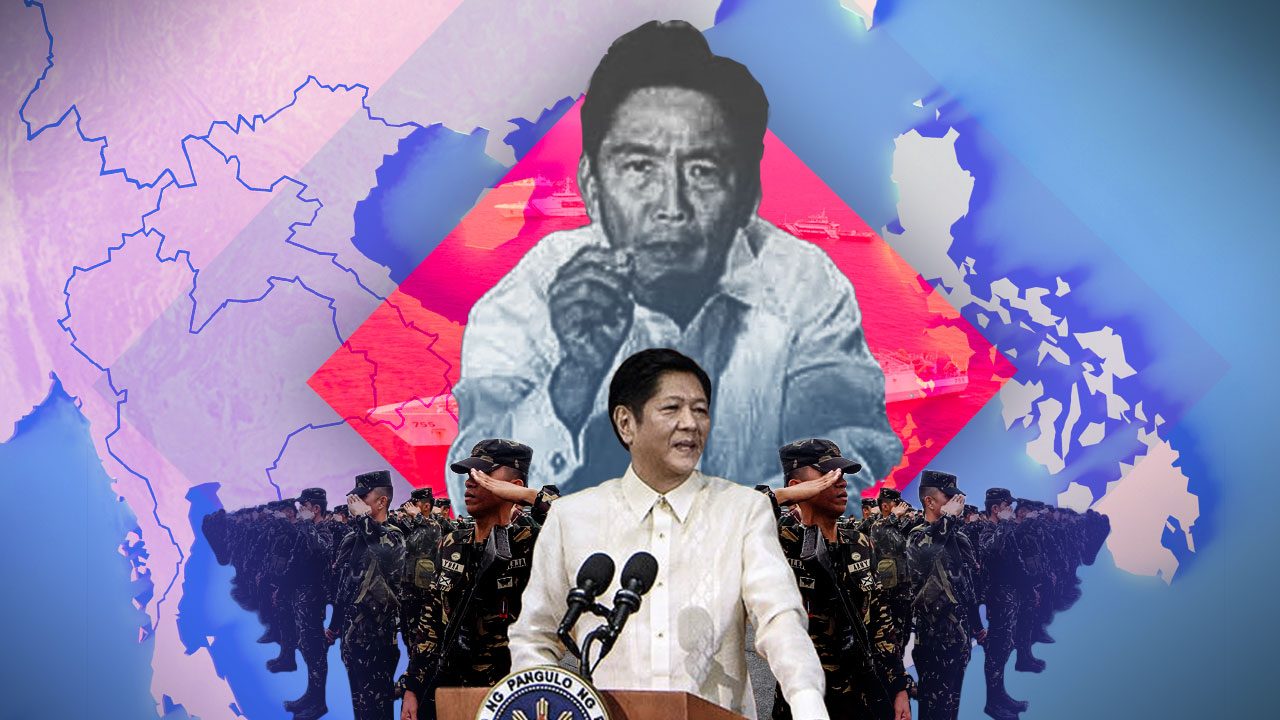
MANILA, Philippines – A handshake and kiss on the cheeks of Mao Zedong. A nighttime escape aboard US helicopters. And an infamous name that has stoked anger, contempt, and now, admiration.
As a new government takes the helm in the Philippines, President Ferdinand Marcos Jr. is ushering his family’s biggest comeback after its fall from power in 1986, when Filipinos ousted the late dictator, his father and namesake, in a peaceful uprising that captured the world’s attention.
Now back in Malacañang, Marcos is overseeing efforts to rehabilitate a pandemic-battered country, and along with it, his image – both at home and abroad.
Unlike past administrations, the Marcos government’s new wave of diplomacy is influenced not only by an increasingly volatile landscape, but the President’s own complicated history involving close personal encounters with major powers.
How will the Philippines’ new chief diplomat deal with the US, the country that put his family on trial for ill-gotten wealth? And how will the US court Marcos, considering Manila’s strategic importance for Washington in a region where China seeks to dominate and expand its influence?
What about China itself, given how the late Ferdinand E. Marcos established diplomatic ties with Beijing in 1975? While Filipinos want the government to defend the West Philippine Sea, it was a ruling won under Benigno Aquino III – son of the Marcoses’ nemesis – that remains the country’s strongest leverage. Is Marcos willing to use the Aquino-era Hague ruling against Beijing?
Marcos faces a one-of-a-kind diplomatic challenge: himself.
Rocky past
Nothing could have been more unimaginable 36 years ago, than the guest – and the host – at Malacañang on August 6.
“Welcome to the Philippines!” said Marcos, styled in a barong, as he greeted US Secretary of State Antony Blinken during his first official visit to the country.
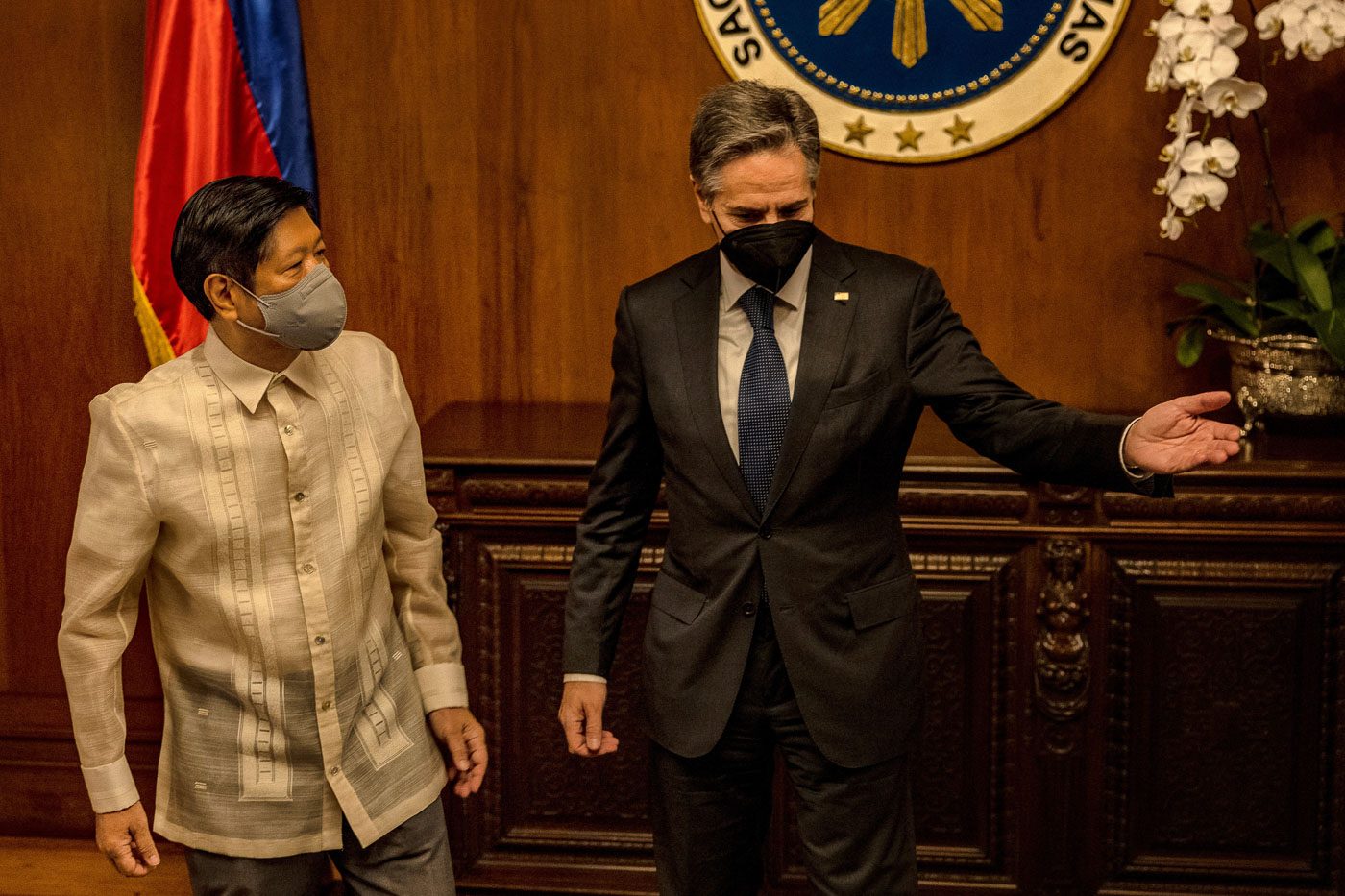
In the same halls where he welcomed Blinken, a younger Marcos had been forced to flee to safety on the night of February 25, 1986, during the People Power revolt. A stealthy evacuation, facilitated by the US government under the Reagan administration, would eventually see Marcos and his family exiled in Hawaii until 1991.
“I’m sure they’re discussing that (history),” said former Philippine ambassador to the US Jose Cuisia in an earlier interview with Rappler. “But they also have to remember that had the US not plucked the family out – you know, when the crowds ransacked Malacañang, they were ready to commit violence against the Marcoses,” he added.
“They were saved by the US; and not only the family, but some of their cronies, so they should keep that in mind,” Cuisia said.
Before the fall of the late dictator’s regime, the US had backed military rule in the Philippines, despite widespread corruption and human rights abuses.
Years later, exiled in America, the Marcoses faced an onslaught of cases involving human rights violations and ill-gotten wealth that had been amassed under the regime of its late patriarch. “They (Marcoses) were told ‘you have no immunity at all here in the United States…. Within about ten days or two weeks there must have been over a hundred legal suits filed against them,’” Robert Rich Jr., who was deputy chief of mission at the US embassy in Manila at the time, recalled in an interview in 1994.
The “difficult” period would remain a sore spot for the younger Marcos. After his father’s death in 1989, Marcos was made to answer for many of his family’s crimes. And as his father’s son, he was likewise left to face its legal cases, one of which included a standing contempt judgment issued by a US court in connection with a human rights class suit.
The case has, in turn, barred Marcos from traveling to the US for years, a hurdle that may soon pass now that he is a sitting head of state.
For now, at least, Marcos appears to have a changed mindset. Unlike Duterte, who had sought to break away from the US, Marcos has signaled his willingness to bolster ties with Washington. The Philippine president has more than once described the country as an “important” ally of Filipinos, despite his personal rocky past.
Shortly after his landslide victory, Marcos himself voiced his commitment to strengthening relations with the US during a call with President Joe Biden, no less, who had been the first head of state to phone and congratulate the new Philippine leader.
Marcos later added during his meeting with Blinken that the Philippines would deepen its military alliance with the US, with whom it shared a Mutual Defense Treaty (MDT). “We can no longer isolate one part of our relationship from the other. We are too closely tied because of the special relationship between the United States and the Philippines and the history that we share,” Marcos said.
With these, Derek Grossman, a defense analyst at the RAND Corporation observed that “Marcos’ intentions appear to be the exact opposite of Duterte’s, who sought to systematically dismantle the alliance, one agreement at a time.”
“That is a good thing for Washington and almost certainly represents a nod to the elder Marcos’s prioritization of the alliance,” Grossman added in an analysis.
The development bodes well for the US, which has deployed an effort to shore up its alliances in Asia as it faces rising competition with China.
Some of Marcos’ policy positions, like his preference to see the Philippines strengthen its defense posture, should likewise be welcomed in Washington. “It would fit neatly into the Biden administration’s strategy of so-called integrated deterrence, in which US allies and partners work together to deter China and other adversaries, such as Russia,” Grossman said.
On the US’ part, security and diplomacy officials have demonstrated renewed attention to its ties with the Philippines, after relations between the two longtime allies fell to their lowest point under the Duterte administration.
Conscious of avoiding strained ties with the Philippines once more – an option it can ill afford in the region – the Biden administration appointed Ambassador MaryKay Carlson, a senior career diplomat, as its envoy to Manila, and has, so far, expressed its willingness to work with the Marcos administration.
Aside from enhancing its military deals, the US government has similarly embarked on economic projects in clean energy and agriculture – two areas the Philippine leader identified as high priorities. Though US officials have said human rights issues would be raised with the Marcos administration, it has given little detail on whether specific cases, such as the erosion of press freedom, extrajudicial killings under Duterte’s brutal drug war, or continued detention of former senator Leila de Lima, have been discussed as points of concern.
While in Manila, Blinken had also underscored that the countries’ MDT covered the South China Sea, where the Philippines is locked in a territorial dispute with the Asian superpower.

Rosy memories
But where there is a complicated history with the US, Marcos and his family have shared rosier memories with China.
In the years of the Cold War, Marcos’ father made the decision to foster relations with the Government of the People’s Republic of China in 1975, making the Philippines one of the first countries in the world to establish diplomatic ties with Beijing.
The formal creation of ties was facilitated by a historic trip to China that Imelda, Marcos’ mother, took in October 1974, acting as a special presidential envoy. The younger Marcos joined his mother’s travel, which brought both family members face to face with then-chairman Mao Zedong.
The encounter between the Marcoses and Mao would later make for one of the most famous meetings between Imelda and a foreign leader. Mao, clutching Imelda’s hand, planted a kiss on the former first lady’s fingers.
Imelda would later heap praises on the gesture, which she considered as one of her “proudest moments.” “He took my hand and kissed it… And that was the beginning of the end of the Cold War. Because the Philippines was America junior,” Imelda told Agence France-Presse in 2009.
While it was the image of Mao and Imelda that would later make headlines, footage of the meeting recorded by the Associated Press caught a moment often overlooked in accounts of the meeting: After Mao kissed his mother’s hand, the younger Marcos excitedly held Mao’s hands in his as he, too, moved to kiss each of the Chinese leader’s cheeks.
The trip would solidify deep ties between the Marcoses and China. While outside the national spotlight, the Marcoses continued to foster cordial relations with Chinese officials.
In 2007, the Chinese Ministry of Foreign Affairs established a consulate in Laoag, Ilocos Norte – a bailiwick of the Marcos clan. In 2021, Imelda also received an award from the Chinese embassy and the Association for Philippines-China Understanding, which paid tribute to Filipinos who promoted friendly ties and fostered “mutual understanding” between Manila and Beijing.
After winning the presidency, China had also been one of the first countries to reach out to Marcos.
Owing to these personal connections, some analysts see Marcos moving the Philippines closer to China, arguing the President would have more to gain from close ties with Beijing, which has expressed willingness to fund infrastructure and agricultural projects under his administration.
Others are more sanguine. Likewise owing his family history, some observers see Marcos as being better positioned to foster more productive ties with China compared to Duterte. “This (history) does not necessarily mean that Bongbong will be soft on China, especially if he looks back to his father’s legacy for lessons on how to deal with Beijing, or neglectful of the need to also be in good terms with Washington,” said Aaron Jed Rabena, an analyst at the Asia-Pacific Pathways to Progress research group.
“Bongbong’s willingness to engage with China, like Duterte’s, is likely driven by pragmatism, given China’s irresistible economic and geopolitical weight, and perhaps some personal appreciation of the significance of the bilateral relationship,” he added in an opinion piece.
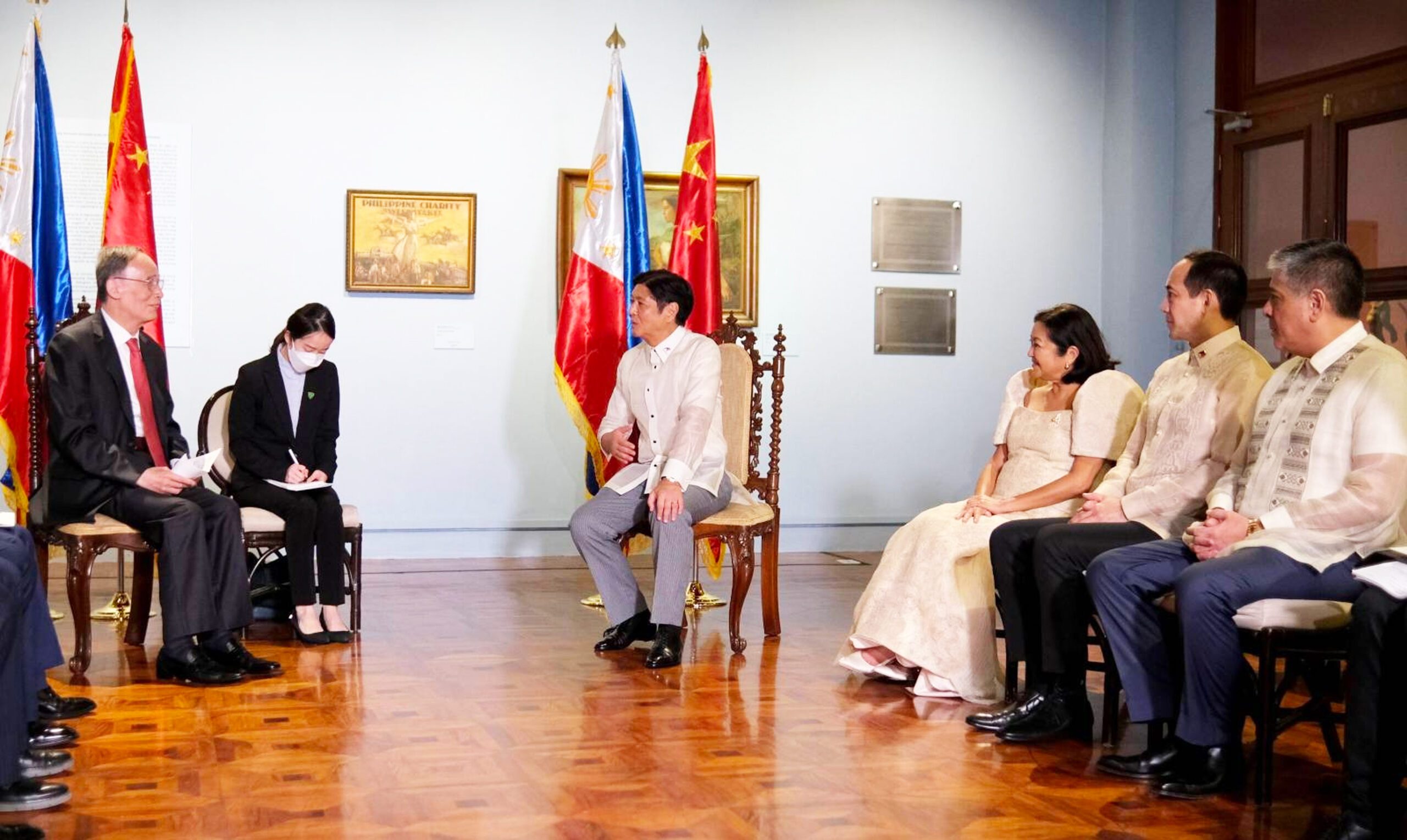
Like the US, Chinese officials were quick to court the new Philippine leader, sending Chinese Vice President Wang Qishan to attend Marcos’ inauguration, while Chinese Foreign Minister Wang Yi claimed the mark of being the first foreign minister to visit the new Filipino president.
But, similar to past Philippine administrations, cordial ties between Manila and Beijing continue to exist only at the official level.
While the Marcos family has enjoyed close ties with the Chinese, a recent survey by Pulse Asia showed that as of June 2022, only 3 out of 10 Filipinos believe the Philippines should trust China. In contrast, the US continues to enjoy the highest level of trust among Filipinos, with nearly 9 out of 10 saying the Philippines should trust its longtime ally.
Despite solid ties that bind the Marcoses and China, majority of Filipinos continue to filter their view of, and attitudes toward, the Asian giant through the country’s dispute in the West Philippine Sea, where Filipino fishermen have been edged out by Chinese ships that continue to swarm features and assert Beijing’s claims in Philippine waters.
Marcos has appeared to be aware of the limits of personal ties with China. During his first State of the Nation Address, Marcos vowed he “will not preside over any process that will abandon even one square inch of territory of the Republic of the Philippines to any foreign power.”
The statement, met with a standing ovation from lawmakers and Cabinet officials present at the Batasang Pambansa, marked a stark contrast to the defeatist stand Duterte had bannered until the end of his presidency – a position that benefited China and set back the Philippines’ efforts to protect its rights in the West Philippine Sea.
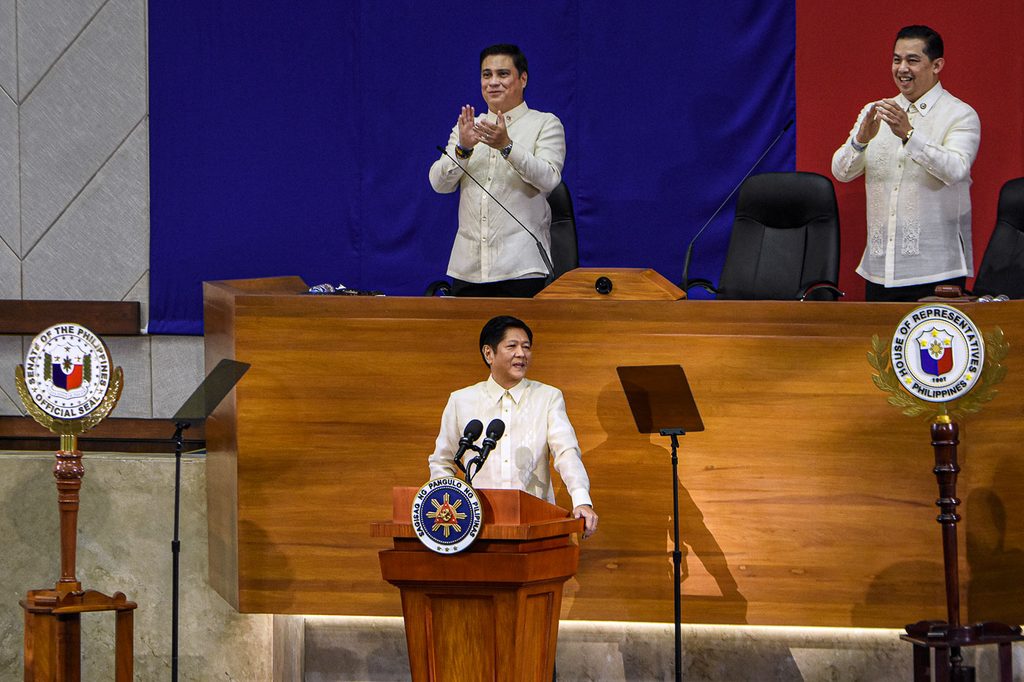
Balancing act
Still, it is the early days of the Marcos administration. While a storied past with the US and China may impact his personal dealings with the two countries, Marcos’ true test comes in acting as the Philippines’ chief architect of its foreign policy for the next six years.
Already, challenges lie ahead as Marcos has come into power amid a volatile geopolitical landscape that demands a delicate strategy from the Philippines: the war in Ukraine; rising tensions in Taiwan, an island that shares a sea border with the country off the north of Luzon; rising food prices; and the country’s dwindling energy supply that could pressure the President to restart oil exploration activities in the West Philippine Sea.
So far, Marcos has attempted to strike a balance, saying the Philippines will continue to uphold a position where it is “friends to all, enemies to none.”
For Charmaine Willoughby, an associate professor at the De La Salle University’s Department of International Studies, while the phrase carries echoes of Duterte, the outlook could ground the country’s deliberation on its relations with other countries – if Marcos remained aware of its limits.
“A key lesson here for the Marcos administration – and where the ‘friends to all’ policy is a stark difference – is the need for an overarching strategy rather than the vacillating foreign policy of Duterte,” Willoughby said. “There is nothing wrong with this (outlook) per se, but in international politics, we will inevitably encounter enemies.”
“If the Philippines’ prime motivation is to befriend everyone, how do we then deal when friendships sour and friends turn to enemies?” she added.
Another area Marcos is expected to constantly face this challenge is in the West Philippine Sea, where the Philippines rallies to recover lost ground, after Duterte had downplayed the 2016 arbitral award. Also known as the Hague ruling, the country’s landmark legal victory asserted Filipinos’ rights in the West Philippine Sea and struck down as illegal China’s claims to Philippine waters.
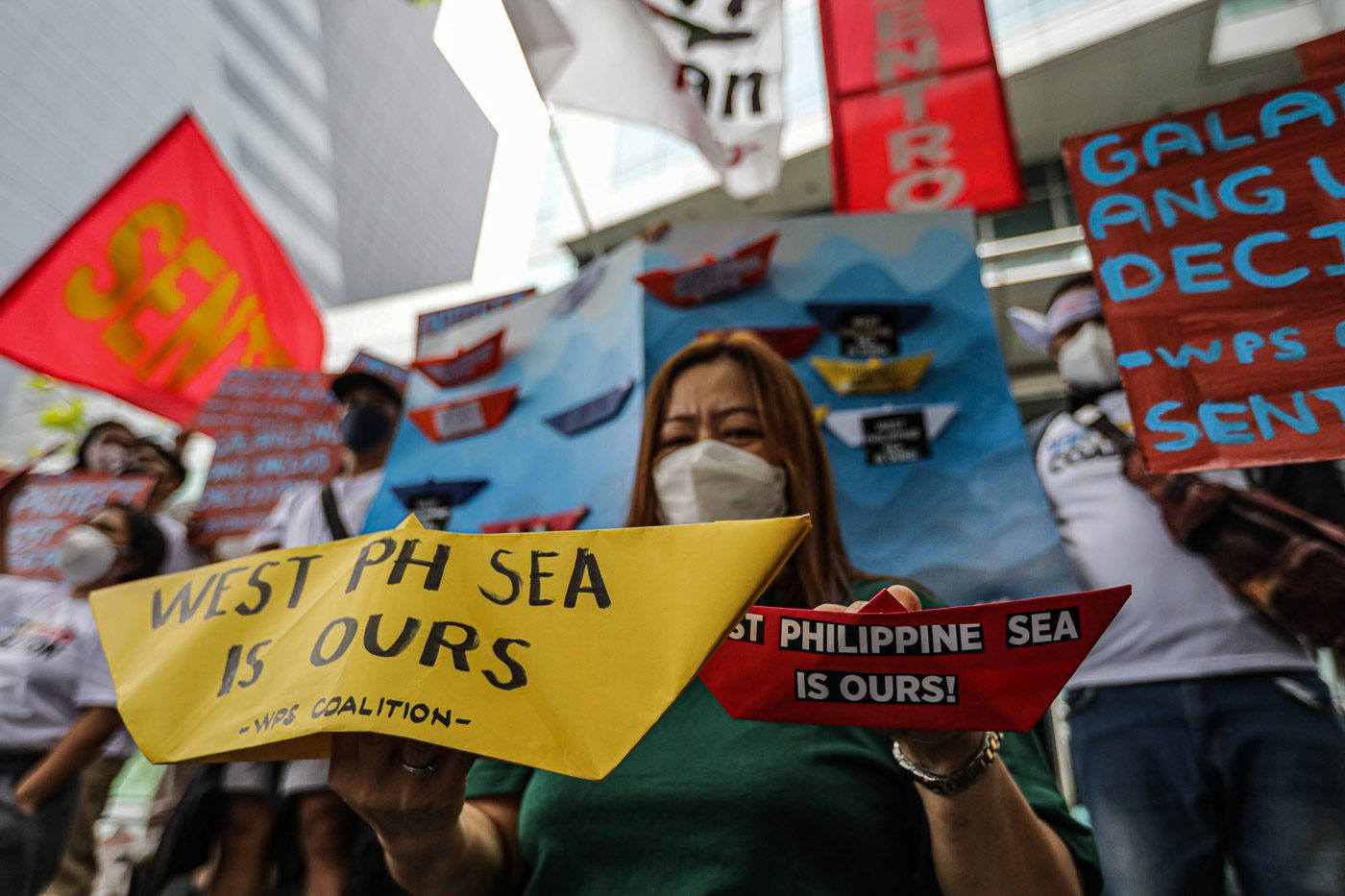
“It is more difficult to hedge now,” said Enrico Gloria, an assistant professor of international relations at the University of the Philippines. “When we hedged under (former president Fidel) Ramos, the conflict was not yet resolved. But now we have a ruling that we must uphold because it is treasonous not to uphold it,” he added.
Saying the right things
So far, the Marcos administration appears to be taking the right steps. While Duterte neglected to back the historic legal award handed to the Philippines at the start of his presidency, Marcos himself vowed to uphold the Hague ruling. During the sixth anniversary of the award, Marcos foreign secretary, Enrique Manalo, also declared that the 2016 arbitral award would be anchored on the country’s policy in the West Philippine Sea, along with the United Nations Convention on the Law of the Sea.
Gloria viewed this as a promising development. To balance interests effectively, the Philippines’ foreign policy “should first and foremost identify its non-negotiables,” he said.
The appointment of Manalo, a respected career diplomat with over 30 years of experience, has likewise been viewed by experts as a positive development that could bolster Marcos’ image in the international community.
Meanwhile, ongoing tensions between the US and China, a flashpoint in Taiwan, as well as Marcos’ desire to have trade with foreign governments boost the country’s economic recovery, could also serve as reality checks.
“While the US and China are both paying lip service to not making countries in the region choose a side, the space to maneuver without at least being perceived to pick a side is closing in,” said Dominique Fraser, a researcher at Asia Society’s policy institute.
After Duterte shook up the country’s ties with his erratic policies, many officials and foreign capitals are now looking to Marcos and his Cabinet to restore stability, or at least, consistency, in the Philippines relationships with its partners.
Marcos’ sweet spot?
The stakes are high for Marcos, but so are its rewards. In committing to hold the Philippines’ national interest as “primordial guide,” analysts say Marcos has an opportunity to recalibrate the country’s policy and implement a more effective foreign policy strategy.
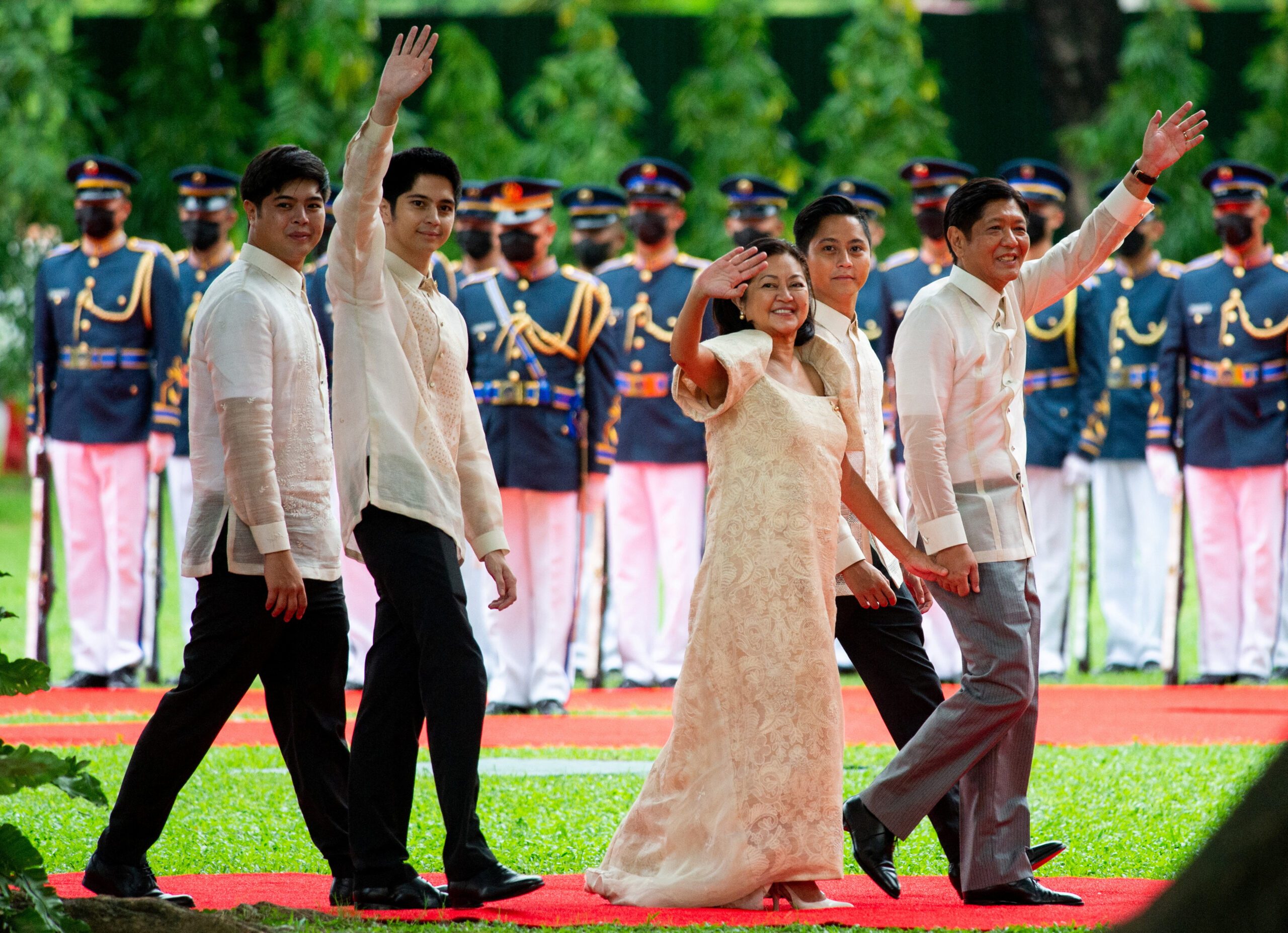
Duterte’s turbulent term, which had tested ties with some of the country’s closest allies, has also set the stage for Marcos to reap early wins with the Philippines’ partners – a move he has taken by establishing open lines with countries who have come to meet him.
“There is a sweet spot as far as Philippine foreign policy is concerned because there is serious intention to improve relations on both (the US’ and China’s) sides,” Gloria said.
It may turn out that history’s timing could also work in Marcos’ favor.
“A congruence of all these factors, where you have tensions in Taiwan, where China is this perennially rising power competing with the US, and the US is in a decline – added with Duterte setting the stage and the nostalgia of Marcos – add it all up and it forces Marcos to adopt a hedging strategy that favors both sides,” Gloria said.
Ultimately, the biggest winner of an improved foreign policy would not only be the Philippines, but Marcos himself. After all, steering the county’s relations is but one part of the Marcos quest for redemption. – Rappler.com
Add a comment
How does this make you feel?


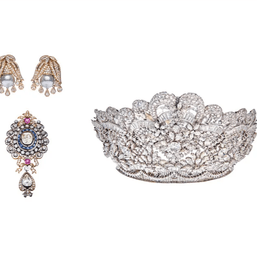
![[OPINION] If it’s Tuesday it must be Belgium – travels make over the Marcos image](https://www.rappler.com/tachyon/2024/04/tl-travel-makeovers-marcos-image.jpg?resize=257%2C257&crop_strategy=attention)




![[Just Saying] SONA 2024: Some disturbing points](https://www.rappler.com/tachyon/2024/07/TL-marcos-sona-points-july-23-2024.jpg?resize=257%2C257&crop=335px%2C0px%2C720px%2C720px)

There are no comments yet. Add your comment to start the conversation.